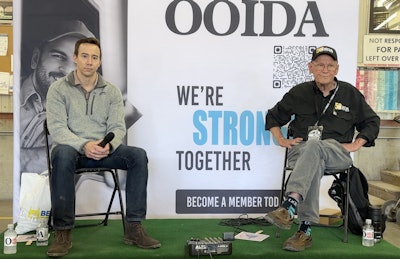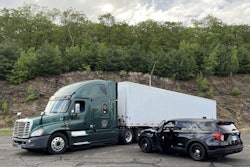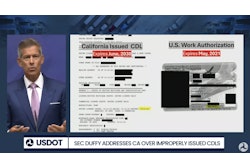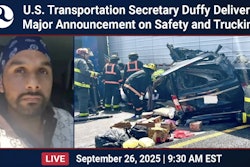
Just hours after the Department of Transportation’s big announcement Friday, Sept. 27, that it would greatly restrict non-domiciled CDL issuance, a representative from the Federal Motor Carrier Safety Administration met face-to-face with truck drivers in a Q&A session at the Guilty by Association Truck Show in Joplin, Missouri.
- An agency rep took questions and commentary on a range of issues, including about its announcement of rule changes aimed at voiding non-domiciled CDL availability except in rare circumstances.
- FMCSA will take a tougher approach on vetting ELD provider companies for adherence to standards/data manipulation capabilities.
- A second broker-transparency proposed rule will be the result of voluminous commentary on the last proposal. FMCSA urges engagement when it comes next year.
FMCSA Senior Policy Advisor Michael Hampton sat down with Todd Spencer, President of the Owner-Operator Independent Drivers Association, in the installation bay at 4 State Trucks to hear feedback, concerns and general comments from drivers in attendance.
“We want to listen to you, we want to have an open dialogue,” Hampton said in his opening statement. “We may not know about some of the issues that you’re facing. I go to work every day in D.C. in an office. When you guys are in your truck, you guys are seeing what’s happening on the roads. ... We need to have that open dialogue to hear from you so we can listen, take that feedback back, and make good policy that improves your lives and reduces that burden on you and helps the industry.”
With all regulatory issues, Hampton said, “common sense is back on the table" with President Donald Trump and DOT Secretary Sean Duffy. "Common sense is our marching order.” He added that, while it’s “a tough needle to thread,” his approach to policy is to “make it easier for our good actors to do their job, so the government’s burden is not around their neck weighing them down. But I also want to make it harder for the bad actors to do their job and to skirt our regulations.”

He highlighted the FMCSA’s deregulatory efforts so far this year, calling the actions taken so far “low-hanging fruit.”
[Related: DOT's move against 194,000 non-domiciled drivers supported even by ATA, brokers]
While the session wasn’t limited to the topic of non-domiciled CDLs, the news had broken just a couple hours before and was a big part of the discussion. Hampton explained the DOT’s emergency action Friday morning for those who had yet to hear details of the interim final rule (IFR). (Read details of that IFR here.) Hampton called results so far of FMCSA’s audit of states’ non-domiciled CDL issuance practices “chilling,” especially in California, where FMCSA estimated that one in four non-domiciled CDLs were issued improperly.
“Some of these are in which the individual’s employment authorization and the expiration date on the license extended up to four years beyond the employment authorization in which they were allowed to work in the United States,” Hampton said. “Some were issued without verifying any documentation at all.”
As reported, California was one of six total states the agency identified in the early stages of its audit that had significant issues related to non-domiciled CDL issuance. “We expect those states to grow as our nationwide audit of those non-domiciled CDLs continues,” Hampton added. “But it was important that, based on that and the lost confidence in that issuance process, that we needed to take immediate action.”
One attendee agreed with a large segment of Overdrive readers in noting the “non-domiciled CDL shouldn’t even exist. … We’re trying to fix something that shouldn’t even be there. So maybe instead of spending all of this time trying to fix something that shouldn’t be there, maybe it just shouldn’t be there.”
[Related: Ban non-domiciled CDLs for foreign drivers? Owner-ops weigh in]
Hampton explained the origin of the non-domiciled CDL was filling a need for American citizens who lived in a state whose CDL program was de-certified to be able to go to another state where they were not domiciled and obtain a CDL. Since then, however, its use has been expanded for non-citizens.
Other issues identified during GBATS Q&A
ELDs and the hours of service
One trucker in attendance asked Hampton about the possibility of FMCSA reconsidering its electronic logging device exemption for trucks equipped with pre-2000 engines. “We are not the droids you’re looking for,” the commenter said. He added that “there is no data showing that pre-2000 trucks with paper logs are any significant factor of truck accidents, so this is a solution without a problem.”
Following applause from other members of the audience, Hampton addressed the concern and highlighted Duffy’s Pro-Trucker Package, in which the DOT Secretary “made a commitment not to extend the ELD mandate to pre-2000 trucks.”
Hampton also took this opportunity to highlight the recent announcement that FMCSA is planning two pilot programs to collect data on the safety impacts of increased hours-of-service flexibility with the ability to pause the daily 14-hour clock for up to three hours, and with additional split sleeper options.
“What I believe is that if you give truckers flexibility in their schedule, that that is going to make a safer, more well-rested trucker,” Hampton said. “We have to have the data to show it. We can’t make that change without data, and that’s why we have to do these studies. That’s why we are doing these pilot studies. I encourage folks, when that becomes available, to sign up and be strong, good participants in that study.”
[Related: Sleeper berth: Will truckers be able to split as they see fit?]
Hampton also noted that when developing a plan for those pilot programs, he told others at FMCSA to “don’t even think about” requiring cameras in the trucks of pilot program participants because it was “going to be a non-starter for folks that want to participate.”
He also said that while the agency is “still working the details out on this, there may be" some measure of (likely minor) "compensation for those who participate in that study, because we want good data.”
On the topic of data, another attendee asked Hampton when FMCSA is “going to look at the data for ELDs. ... When the ELDs came into play, that’s when we started having a lot more accidents. If we could go back to paper, a lot of us older hands out here would be a lot happier.”
[Related: ELDs and highway safety: Crashes, injuries, fatalities all rise post-mandate]
FMCSA’s hands are essentially tied when it comes to ELDs, Hampton said, because the devices were mandated by Congress. Congress could always repeal the requirement, though, and FMCSA recognizes that there are problems with ELDs because “there are folks out there who have these ELDs in which they are able to be manipulated, and we need to ensure that we’re going to enhance the vetting process of ELDs to ensure those are less likely to be manipulated, so the bad actors are not able to skirt the system.”
Hampton also announced that FMCSA will be enhancing its vetting of ELDs. He said the agency wouldn’t be providing details, “because we don’t want to give the playbook to all of the ELD manufacturers … but we are going to enhance ELD vetting at the front end to ensure these bad actors aren’t getting in the front door.”
[Related: Are inspectors missing an easy way to catch HOS cheats and non-compliant ELDs?]
CDL training
Multiple truck drivers highlighted CDL schools and the perception that many are not properly training drivers, or are only teaching the bare minimum required to pass the knowledge and skills tests.
Hampton acknowledged the importance of having qualified drivers behind the wheel, but he also noted that “training should be consistent across the different schools, and right now, we have heard reports and have seen that there are some schools that are not holding to the same standards as they should. And we want to take action on those.”
He said FMCSA has “looked through all of the entry-level driver training providers that have failed to file their biennial update, and we’ve sent them notices of proposed removal” from the Training Provider Registry. “That’s low-hanging fruit, but it’s beginning to take action."
Truck driver Tom Love expressed concern with the ability of third-party testers to conduct CDL skills tests. “Can we trust these third-party sites that are testing? Because it’s basically pay for play to get your license,” he said. “There should be standards. These third-party testing sites should be held accountable.”
Hampton noted the DOT Office of Inspector General recently announced an audit into FMCSA’s oversight of states’ CDL testing programs. He said the agency is often asked why there is a need for a crackdown on English language proficiency when there’s already a requirement that CDL skills testing be conducted in English.
“It’s pretty clear to us that that requirement, somewhere, at some time, is not being followed,” he said. “Because based on violations in which we’ve seen since the English language proficiency went into the out-of-service criteria in the end of June, over 5,000 drivers have been placed out of service for it." Most of those drivers "went through a skills test. Where’s the disconnect? And that’s why we need to ensure that there’s enhanced oversight of that skills test, and if there’s an opportunity for FMCSA to get more involved or to exercise that oversight.”
[Related: Time to go after 'CDL mills' that cause deadly accidents]
Broker transparency
“We recognize it’s a problem,” Hampton said when asked about broker transparency. He referred back to the recent Unified Agenda, which revealed a second notice of proposed rulemaking on broker transparency is expected by May of 2026.
He noted that the first NPRM received “thousands of comments, and we appreciate all of those, and we encourage, based on if there are changes in the next NPRM, that you also use that opportunity to submit your comments to us because we’ll be reading those and analyzing those in terms of how we’re going to move forward from that.”
Truck parking
Hampton recognized that truck parking, too, is “a problem” and said FMCSA knows how big of a problem it is. “It’s not just an inconvenience, it’s a safety issue, as well.”
He noted that as part of Duffy’s Pro-Trucker Package announced earlier this summer, a backlog of grants has been cleared and the DOT is working on getting grant agreements signed so that truck parking expansion projects can actually be built. “It’s not going to fix it nationwide, just the action so far, but it’s a step forward," he said.
OOIDA Executive Vice President Lewie Pugh urged the audience to call their lawmakers to encourage them to include the Truck Parking Safety Improvement Act, which would allocate $755 million specifically for truck parking expansion projects, in the next highway bill.
One member of the audience advocated for turning existing interstate medians into truck parking plazas, similar to how certain toll roads -- Illinois, Kansas -- use the center of the highways for service plazas and parking areas. “The biggest problem with the parking, besides the money, is a place to put them where neighborhoods don’t say, ‘not here,’” he said. “But we have all these medians that we’d love to be able to pull off, take a rest, and then take off again.”
[Related: A brick-and-mortar paid truck parking network, expanding quickly]










